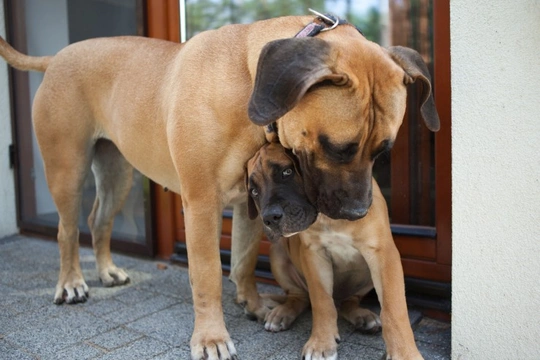
Hyperplasia (Vaginal) in Dogs
Some breeds are more affected by vaginal Hyperplasia than others with Boerboels being high on the list those that do. The condition occurs when a female is in season and it’s where the soft tissue around her vagina becomes very swollen. The swelling is due to a reaction to the estrogen she produces at a certain stage during her cycle and the problem starts when the swelling is so excessive it causes the tissue to spill out of her vulva.
Breeds Most at Risk
As previously mentioned, Boerboels are known to suffer from the condition more than other dog breeds, but it can also affect young females of larger dog breeds too, more especially if they have not been spayed. With this said females of any breed can develop the condition at any stage of their lives if they have been spayed too. Other breeds known to suffer from the condition more than others include the following:
- Labrador Retrievers
- Chesapeake Bay Retrievers
- German Shepherds
- Springer Spaniels
- Treeing Walker Coonhounds
- Airedale Terriers
Signs to Watch Out For
- There are three types of the condition which can affect female dogs and the signs of there being something wrong include the following symptoms:
- Constant licking of their vaginal area
- Pain when urinating which is referred to as dysuria
- A reluctance to mate
The three types of the condition are as follows:
- Type 1 Hyperplasia - this is the mildest form of the condition where only a little swelling occurs and therefore only a slight protrusion develops which means the swollen tissue usually remains inside the vulva
- Type 2 Hyperplasia - this sees the tissue around a dog’s vagina swell a lot more and as a result the tissue around a dog’s vagina starts to protrude out of a dog's vulva quite noticeably
- Type 3 Hyperplasia - this the most severe form of the condition which results in a doughnut shaped mass protruding out of a dog's vulva which is clearly visible
The Causes
It is thought that the problem flares up as a result of excessive estrogen stimulation and research has established that certain breeds are more predisposed to developing the condition because there’s a genetic link. In very severe cases, it can lead to a dog suffering a prolapse and it could mean that a dog has great trouble urinating which can lead to other health problems. Once a dog has developed vaginal hyperplasia and it is successfully treated, the risk of the condition occurring again is high.
Diagnosing the Problem
A vet would carry out a physical examination of a dog suffering from the condition, but the signs of there being something wrong are typically quite evident thanks to the swelling around the vulva. The vet would then determine the severity of the condition and decide on the best treatment accordingly.
Treatment Option
It is important to keep things assclean as possible especially if the swelling is protruding out a dog's vulva. If the protrusion is large, all too often dogs have trouble urinating which is something to watch out and to let the vet know as soon as possible because it could lead to a very serious complication. In most mild cases, things go back to normal once a dog has finished her season, but a vet would recommend cleaning the area frequently and applying a topical ointment that will soothe as well as protect any exposed vaginal tissue. Dogs with the condition should wear an Elizabethan collar to prevent them licking the area which could just make matters worse. Unfortunately, once a dog has suffered vaginal hyperplasia, the risk of them developing the condition again are high even after having been successfully treated the first time.



